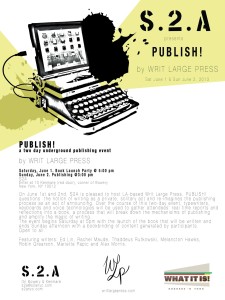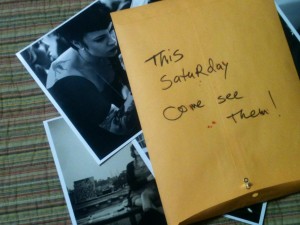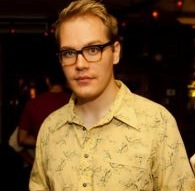I wrote a quick post for Hyperallergic about a great panel discussion held last week at 3rd Ward as part of Krista Saunders’ Intro to the New York Art World class. Check it out, and get in touch with me if you want to get to work on your own professional communications.
Comments closedTag: writing

I am reading this weekend with Mariette Papic and Alex Morris for Writ Large Press’ debut New York event, PUBLISH! I’m looking forward to sharing the new piece as part of this cool site-specific lit experiment. Writ Large’s Chiwan Choi and Judeth Oden-Choi are ambitious, generous people who also write and publish; they have always made an effort to build and maintain a sense of literary community between LA and New York writers (and beyond!). The space and event they’re creating offers room for everyone who attends to participate (or not!) and share their ideas. Also, there will be a typewriter there on Saturday, so I’m excited about that. I’m excited to read this new essay, too. I’ll probably post it on my Tumblr soon.
Comments closed
When I created a writing workshop called “Learn to Love Your Artist Statement,” I knew I was in for some trouble. Then I read Iris Jaffe’s “The Anti-Artist Statement” on Hyperallergic.com, and I felt the need to write a reponse in defense of this most-maligned document. Why?
The primary reasons: For as long as an artist statement is a professional requirement, provide one when asked, and provide the best one you can. If you have trouble writing an artist statement of sufficient quality to meet your own standards (or bio, or statement of purpose), hire someone (me, for instance!) to help, rather than let your name appear next to someone else’s thoughts and ideas. Discuss your philosophical objections within your circle of friends, but don’t be unprofessional when presented with an opportunity; the field is too competitive. And creatively, writing an artist statement can increase your self-awareness and deepen your understanding of what you do–sometimes because writing is an unfamiliar new tool for interacting with your unconscious.
Check out the essay on Hyperallergic and the great discussion it has generated. Feel free to let me know what you think.
Comments closed
(A sneak-preview of Daria Ska’s prints, from her Facebook page.)
Saturday, March 30, I am hosting a reading + curated photography exhibition. You Are Now Here, at The Imaginary Space, features photographers Rebecca Fuller, Erika (Saki) Sequeira and Daria Ska and readers Lauren Belski, Karina Briski, Chiwan Choi and Eric Nelson.
It is an honor to host and present the work of these talented artists.
Join us for:
You Are Now Here
photography exhibition + reading
hosted by Robin Grearson at:
The Imaginary Space
174 Bogart Street, #210
Brooklyn, NY 11206
March 30, 2013, 6-10:30 PM
Artist reception: 6-8 PM
Readings begin: 8:30 PM
About You Are Now Here:
The world just moves faster in New York. The expression “wherever you go, there you are” urges us to take time to ground ourselves, to slow down and pay attention to our environment.
You Are Now Here brings writers and photographers together to showcase words and images that evoke a strong sense of place.
Free admission, prints and books will be offered for sale. Please support our artists!
Featured photographers:
Rebecca Fuller
Erika (Saki) Sequeira
Daria Ska
Readings by:
Lauren Belski
Karina Briski
Chiwan Choi
Eric Nelson
About our artists:
Lauren Belski is the author of the short story collection Whatever Used to Grow Around Here (Crumpled Press) and the forthcoming collective collection The Trout Family Almanac (Papercut Press). laurenbelski.com.
Karina Briski is a writer raised in Northern Minnesota and currently living in Brooklyn. She is the host of Words with Beers, a monthly reading series in Bed-Stuy too cheap for a microphone and too rich to care. She is currently working on a collection of stories about rust belt creeps. Her work can be found online and in print.
Chiwan Choi is the author of two poetry collections, The Flood and Abductions. He is also a founding editor of Writ Large Press, a downtown LA-based small press. He is currently involved in creating LA Writ Large, a non-profit literary think tank focused on changing the economic landscape for writers and publishers. chiwanchoi.com, writlargepress.com.
Eric Nelson is the author of The Walt Whitman House and The Silk City Series and is originally from New Jersey. His essays, criticism and fiction have appeared or are forthcoming in HTMLGIANT, The Billfold, Chimes & Sirens and Volume 1 Brooklyn, among others. His E.P. of recorded stories “They Make a Wasteland, They Call it Pastiche” is being released by Diabetic Koala in spring of 2013. He lives in Ridgewood, Queens.
Rebecca Fuller
Brooklyn-based photographer Rebecca Fuller has been documenting New York’s street art community for many years, and she is also the co-founder of The Street Spot. www.thestreetspot.com.
Erika (Saki) Sequeira
Erika Sequiera’s photographs include portraits from her recent trips to Guatemala and Argentina, as well as her New York home base. www.iheartcoolstuff.com.
Daria Ska
dariaskripka.tumblr.com.
“I was born, I live and some day I will die,
enjoying the time in between – I fly”
Join us:
You Are Now Here!
I had a talk with Cole Stryker recently about anonymity and freedom of speech for the Believer. In his latest book, Hacking the Future, he presents a compelling argument for protecting anonymity at all costs. In the recent outing of troll Violentacrez and Amanda Todd’s tragic suicide, we have come face to face as a culture with privacy’s highest costs. Roxane Gay wrote an interesting essay in The Rumpus as much about not looking as not seeing, and a New Yorker story underlines how anonymity privileges women and men differently. Cole advocates thinking critically about the real costs of an anonymity-free Internet, and draws our attention to those few corporate giants who happen to acquire great power and financial gain when we relinquish our anonymity. “I don’t think anonymity is a Platonic ideal. But the choice is.”
Comments closed